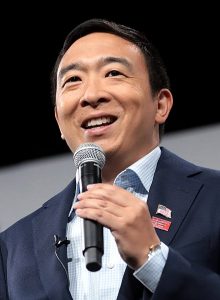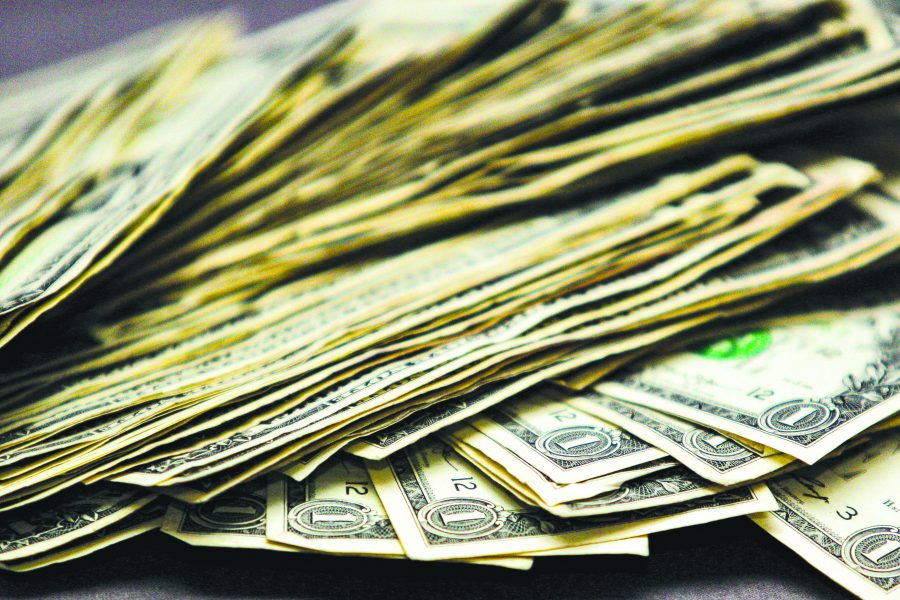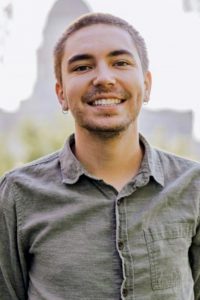Reese: Universal Basic Income Isn’t Radical
Isaac Reese says that universal basic income could have lessened the economic and public health crises of COVID-19. (Photo by Justin Prather | The Daily Utah Chronicle)
April 12, 2020
The world is teetering under the mortal and economic consequences of the COVID-19 pandemic. Because of necessary social distancing practices, a massive recession is expected to hit the world and U.S. economies. Panic and mass hysteria have consumed the U.S. population as people hoard supplies necessary to survive a long period of self-isolation.
This outbreak has already illustrated the brokenness and instability of America’s health care and economic systems — it is clear now, if it wasn’t before, that we needed drastic policy change yesterday. A society underpinned by a patchwork of limited financial safety nets, unaffordable and inaccessible healthcare and an economy burdened by ubiquitous inequality cannot begin to weather a crisis like this once-in-a-century pandemic. Progressive policies are necessary now to provide relief and will be needed, in the months and years to come, to reshape post-pandemic America. Universal basic income is one policy America needs in order to survive in times of national and regional crisis and thrive in times of peace.
Existing Economic Needs
About 78% of Americans currently live paycheck-to-paycheck. The COVID-19 crisis has forced service jobs and businesses to shut down in order to protect public health. Unemployment claims across the U.S. have skyrocketed as jobs are lost every week. This has left millions of the same workers who cannot afford to build their savings to weather this kind of emergency without income or any way to sustain themselves during the crisis.
Even before the outbreak, a $10 hourly wage — let alone the federal minimum wage of $7.25 — was woefully insufficient to meet basic needs like food, shelter and clothing. In Utah, 27% of workers make around $10 per hour and the vast majority of those are adults over the age of 25. Nationwide, 41.7 million workers earn under $12 an hour and 58.3 million workers earn under $15 an hour.
From Radical Idea to Bipartisan Support

Against the backdrop of low-wage America, a universal basic income policy became a part of the national dialogue during Andrew Yang’s 2020 campaign for president. Initially, the idea was considered unrealistic, and it polled poorly among Americans. Since the end of his campaign, Yang has started an organization called Humanity Forward to continue to push his campaign’s platform. In Washington, D.C., policies like Yang’s have already been implemented as part of a major coronavirus relief deal.
Early in this crisis, Republican Senator Mitt Romney floated the idea of giving every American adult $1,000 during the outbreak — though universal basic income is generally viewed as a liberal or socialist policy goal — and he left open the possibility of making the payments monthly. The Trump administration has signed off on a $2 trillion stimulus bill with a tenet similar to universal basic income. Under the bill, most independent single Americans will receive $1,200 in their accounts and couples will get $2,400 with an addition of $500 per child. Unfortunately, adults who are still claimed on their parents’ taxes as dependents will not receive the check, which cuts out many young Americans who work service jobs.
A one-time payment of, at most, a few thousand dollars per household (and less in some cases, when incomes are greater than a certain threshold) will provide some temporary relief to economically imperiled Americans. Unemployed Americans might be able to meet their basic expenses for a month, perhaps two. But a permanent or longer-term universal basic income policy would allow them to have enough food, shelter and other necessities to live comfortably beyond a time horizon measured in months or even weeks. Clearly, this crisis will last much longer than a month.
While Romney’s plan is a good start and there is some relief on its way from D.C., Rep. Maxine Waters has proposed a stimulus package that goes further and will last as long as the crisis itself. Waters’ plan provides $2,000 for every adult and $1,000 for every child within a household for every month of the crisis. With a progressive plan like this, Americans would not have to contemplate the grim reality bearing down on them as soon as Memorial Day weekend.
A Basic Expectation
I used to be against universal basic income myself. The idea, at least on the surface, seemed like the equivalent of a tech-bro apologizing to the working class for automating their living-wage jobs out of existence. It struck me as a clever way for the privileged to assuage guilt rather than a sound economic policy. Now, while I do not think universal basic income is a cure-all for systemic economic inequality, it is clear to me that we should have implemented this policy a long time ago. When the pandemic instantly eliminated jobs, people were rightfully worried about how to keep a roof over their heads and food on the table. People need assurance that they can provide for themselves and their families — reassurance that a national emergency will not destroy their lives in the span of weeks.
Sam Altman, president of Y Combinator, an organization that nurtures tech start-ups, is an advocate for universal basic income. Altman wrote four years prior to this crisis that, “50 years from now, I think it will seem ridiculous that we used fear of not being able to eat as a way to motivate people.” Altman seems to intuit that if people are freed from the daily struggle for mere survival, many will ultimately prove themselves to be a great benefit to society, creating more economic and intrinsic value than the sum total of their universal basic income payments.
Yang’s argument for universal basic income was based around these same ideas. When people’s basic needs are met, they can focus on other pursuits and demands. If Americans had a universal basic income before this pandemic, they would be secure in the knowledge that they have enough money to keep them fed and sheltered, thereby making self-isolation more realistic and more widely practiced. Increased self-isolation would have led to a reduction in mass infection, which would have considerably lessened the economic tsunami that is playing out before our eyes and dwindling bank accounts.
Like Social Security, universal basic income is one of many progressive policies that are often called “radical” upon introduction to the national consciousness. However, once the dialogue surrounding universal basic income is stripped of contrived hysteria, breathless hyperbole and misstated fact, the premise makes sound economic sense. Not only would a universal basic income provide economic security for America’s poor and working classes, but it would also lead to stability among all socioeconomic classes. After all, a cooperative and mostly content populace is integral to national prosperity and economic growth. Nothing could be more antithetical to that than a nation shamed by the disgrace of millions of hungry, sick and homeless people roaming squalid streets. That is a universal, basic expectation that is far from radical.
Editor’s note: Signs and symptoms of COVID-19 include fever, dry cough, tiredness and shortness of breath. These symptoms are believed to occur between two and 14 days after a person is exposed to the disease. If you have these symptoms and have recently come into contact with a person who is known to have COVID-19, or if you have recently traveled to an area with community spread of the disease, you should call your doctor. Areas with community spread of COVID-19 are believed to include China, South Korea, Italy, Iran and Seattle. If you do not have a doctor who you visit regularly, please call the Utah Coronavirus Information Line at 1-800-456-7707 or the University of Utah Health hotline at 801-587-0712. Do not go to a healthcare facility without first making arrangements to do so.









Joy Davis Allen • Apr 12, 2020 at 10:07 am
Thank you for your article. I’m a strong supporter of UBI and Andrew Yang. This policy alone would change our society in radically wonderful ways. Imagine a country that provided a floor for every citizen to stand on. No one can “pull themselves up by their bootstraps” if they don’t have boots to begin with. Our leaders need to look up and act now. I fear the disaster that awaits us all of this isn’t implemented now. For the sake of our future and the planet’s, it’s time to demand UBI. Once that has been adopted we can start to tackle the other problems of our society Without it, we are facing a future that is bleak.